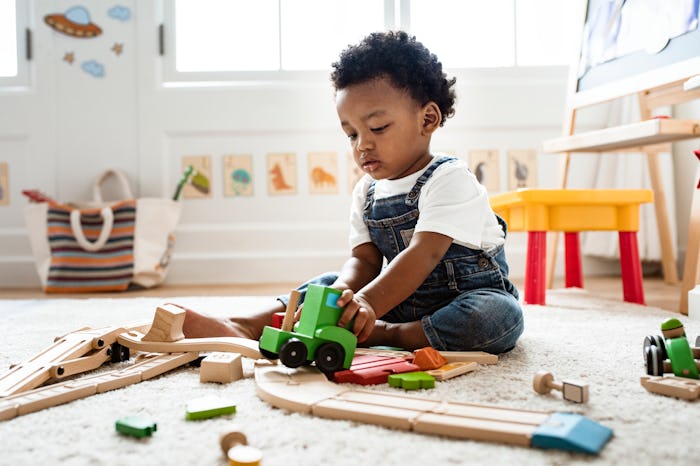Despite the pain of stepping on a Little People figurine, there are some benefits to having baby toys strewn around your house. Toys can be a great way for your baby to learn and develop essential life skills as they grow and discover more about the world, and when babies really start playing with toys, they can attempt to keep themselves busy. But when does your baby actually start playing with them instead of just gumming toys or tossing them across the room?
Mia Rosenberg, psychotherapist and owner of Upsider Therapy, tells Romper that babies will likely begin showing an interest in toys within the first few months of their lives. "As babies develop, they will begin to recognize that they are in control of some of the reactions they are having to things around them. They will begin to smile, giggle, and even start to notice they have hands and feet, and that they have control of their hands opening and closing," she says. At around 3 to 4 months, Rosenberg says babies realize their hands can also grab and pick up objects. At this point, they'll start reaching for things (hopefully their toys) and will want the items that grab their attention. (And ultimately shove it in their mouth.) Around this age, babies are particularly captivated by rattles that make noise, brightly colored toys, or books with textures.
Still, it takes a few more months before babies actually start to really like and remember the items that they're playing with. According to Rosenberg, they won't start playing favorites with toys until around 5 to 7 months old when they begin to develop attachments and enter the stage of object permanence — the concept of understanding that if a toy is out of their sight, that doesn't mean it's gone forever. "During this stage of development, we often begin to see children becoming attached to specific toys. It is not uncommon that the toy becomes their ally and travels with them everywhere they go. This is often seen in a lovey, a stuffed animal, or a blanket," Rosenberg says.
If you start to notice that your little one is spending a ton of time playing with their toys, that's a good thing! Toys aren't just something for babies to play with: they aid in developing fine and gross motor skills. "As babies learn about how they can interact with toys, they will begin to develop motor skills, as well as healthy emotional, physical, social, and mental development. These skills range from problem-solving skills — with puzzles or stacking toys — to social skills," says Rosenberg. In fact, babies should be playing with their toys every single day in order to fully learn how to interact with the world around them.
Finding the perfect toys for your little one really depends on their age. Rosenberg says that for babies 0 to 3 months, you should focus on super simple toys that make a noise or play music so they can begin tracking sounds. From 4 to 6 months, look for bright, safe, soft toys that will be interesting for them to look at and easy for them to grab and hold onto. From 6 to 9 months, you'll want toys that make sounds and have textures, but they should also be safe since babies will likely stick them in their mouths. Baby-safe mirrors are also ideal at this age. And from 9 to 12 months, give baby interactive toys like building blocks so they can start to understand that playtime is social and fun.
Expert:
Mia Rosenberg, psychotherapist and owner of Upsider Therapy
